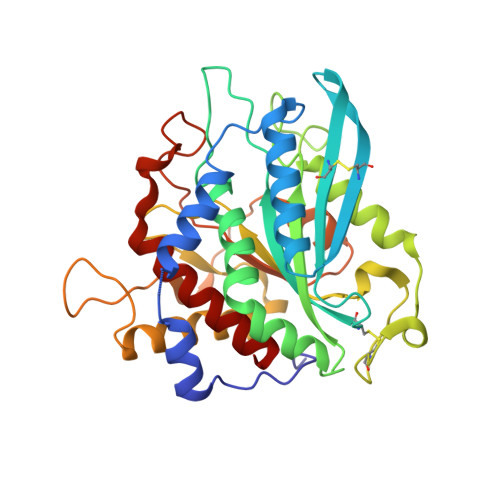Structural and functional analyses of a glutaminyl cyclase from Ixodes scapularis reveal metal-independent catalysis and inhibitor binding.
Huang, K.F., Hsu, H.L., Karim, S., Wang, A.H.(2014) Acta Crystallogr D Biol Crystallogr 70: 789-801
- PubMed: 24598748
- DOI: https://doi.org/10.1107/S1399004713033488
- Primary Citation of Related Structures:
4MHN, 4MHP, 4MHY, 4MHZ - PubMed Abstract:
Glutaminyl cyclases (QCs) from mammals and Drosophila are zinc-dependent enzymes that catalyze N-terminal pyroglutamate formation of numerous proteins and peptides. These enzymes have been found to be critical for the oviposition and embryogenesis of ticks, implying that they are possible physiological targets for tick control. Here, 1.10-1.15 Å resolution structures of a metal-independent QC from the black-legged tick Ixodes scapularis (Is-QC) are reported. The structures exhibit the typical scaffold of mammalian QCs but have two extra disulfide bridges that stabilize the central β-sheet, resulting in an increased thermal stability. Is-QC contains ~0.5 stoichiometric zinc ions, which could be removed by 1 mM EDTA. Compared with the Zn-bound form, apo-Is-QC has a nearly identical active-site structure and stability, but unexpectedly possesses significantly increased QC activities towards both synthetic and physiological substrates. Enzyme-kinetic analysis revealed that apo-Is-QC has a stronger substrate-binding affinity, suggesting that bound zinc interferes with substrate binding during catalysis. The structures of Is-QC bound to the inhibitor PBD150 revealed similar binding modes to both forms of Is-QC, with the exception of the inhibitor imidazole ring, which is consistent with the comparable inhibition activities of the inhibitor towards both forms of Is-QC. These findings have implications for the design of new QC inhibitors.
Organizational Affiliation:
Institute of Biological Chemistry, Academia Sinica, Taipei 11529, Taiwan.
















